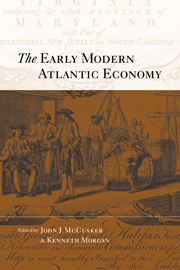Book contents
- Frontmatter
- Contents
- List of figures
- List of tables
- List of abbreviations
- List of contributors
- Dedication
- Introduction
- Part I The role of merchants and their connections
- Part II The development of trades
- Part III Imperial economies
- 9 France, Britain and the economic growth of colonial North America
- 10 Merchants and bankers as patriots or speculators? Foreign commerce and monetary policy in wartime, 1793–1815
- 11 America and the crisis of the British imperial economy,1803–1807
- Part IV Colonial working societies
- Index
10 - Merchants and bankers as patriots or speculators? Foreign commerce and monetary policy in wartime, 1793–1815
from Part III - Imperial economies
Published online by Cambridge University Press: 16 October 2009
- Frontmatter
- Contents
- List of figures
- List of tables
- List of abbreviations
- List of contributors
- Dedication
- Introduction
- Part I The role of merchants and their connections
- Part II The development of trades
- Part III Imperial economies
- 9 France, Britain and the economic growth of colonial North America
- 10 Merchants and bankers as patriots or speculators? Foreign commerce and monetary policy in wartime, 1793–1815
- 11 America and the crisis of the British imperial economy,1803–1807
- Part IV Colonial working societies
- Index
Summary
Merchants, credit and overseas trade
After protracted debate few historians now ‘represent’ foreign commerce as the primus mobile behind the development of power and prosperity in Great Britain between 1688 and 1815. Many will observe, however, that over the long eighteenth century the British economy succeeded in securing extraordinary shares of world trade in manufactures and in shipping, banking, insurance and other mercantile services. They might also agree that the rapid enlargement of the island's commerce with the rest of the world actively promoted the long-term development of its industry and towns, extended the state's fiscal base, increased stability and security for the realm, and promoted the nation's imperial and economic ambitions in Africa, Asia and the Americas.
Foreign trade with Europe and trans-oceanic commerce with more distant continents had, however, to be organized and financed. And the multifaceted connections between merchants and their role in extension of credit, on the one hand, and long-term growth in volume, range and organizational complexity of British connections with the rest of the international economy on the other, have been analysed in depth and sophistication by Jacob Price. Aristocrats had long been alive to the material gains and power that would accrue to them from commitment to maritime trade and empire.
- Type
- Chapter
- Information
- The Early Modern Atlantic Economy , pp. 250 - 277Publisher: Cambridge University PressPrint publication year: 2001
- 2
- Cited by

